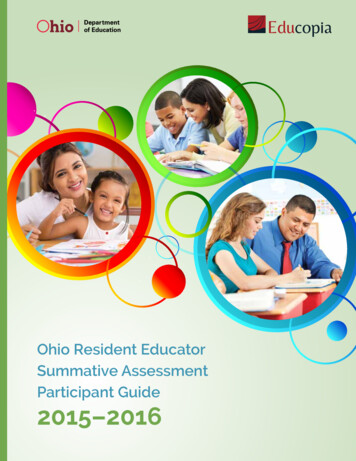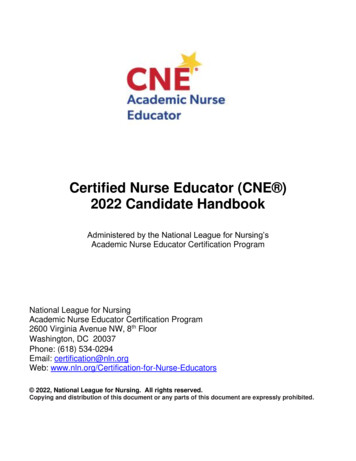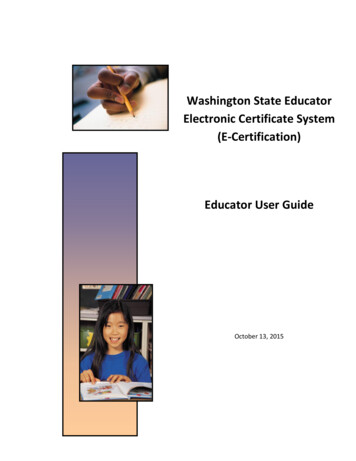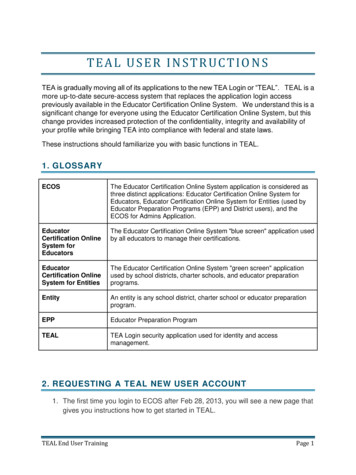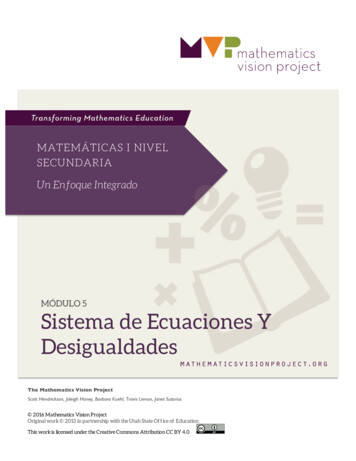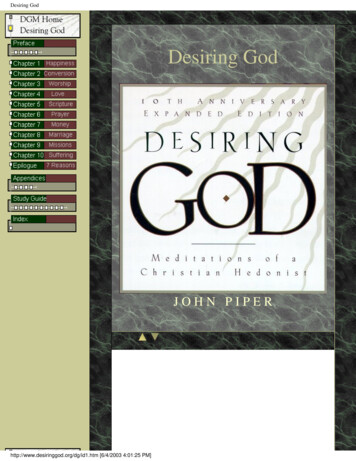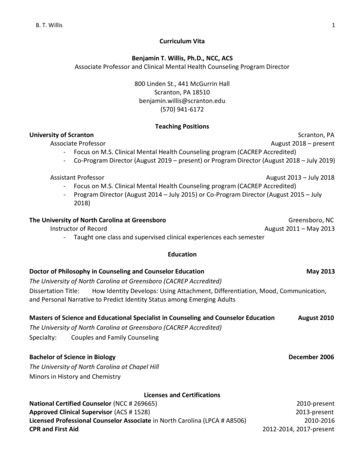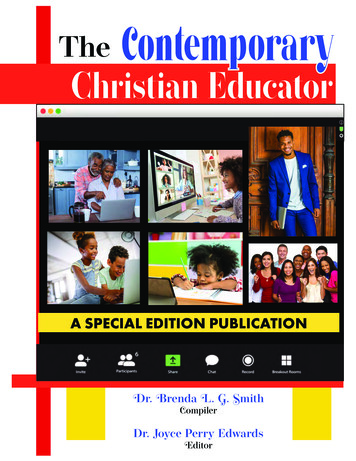
Transcription
TheContemporaryChristian EducatorA SPECIAL EDITION PUBLICATIONDr. Brenda L. G. SmithCompilerDr. Joyce Perry EdwardsEditor
THE CONTEMPORARY CHRISTIAN EDUCATORA SPECIAL EDITION JOURNALTHE CONTENTSIn the Foreword, Bishop Dennis Proctor sets forth a framework for the three Rs in the ministry of Christian Educationin the Post-Covid 19 Era: Reading or meaningful Biblical and moral learning, Responsiveness to the needs andcharacteristics of the persons we serve, and Resourcefulness or the appropriate use of diverse strategies for intendedoutcomes. This special edition journal offers for the Christian Educators in Zion a series of articles that elaborates thisframework. The compiler is grateful to the authors for their contributions.FOREWORDBishop Dennis V. Proctor3SHOULD CHRISTIAN EDUCATORS BEINVOLVED IN TODAY'S POLITICS?READING & LEARNINGTHE CASE FOR BIBLICAL LITERACY5Rev. Dr. Paul S. AtlasSPIRITUAL FORMATION ANDDISCIPLESHIPRESOURCEFULNESSRev. Dr. Clifford BarnettTHE ACOLYTE: REIGNITING THE TRADITION 27Rev. Dr. R.J. Chandler, Sr.7Rev. Dr. Carmichael D. CrutchfieldMETHODOLOGY FOR DIVERSITY IN21ST CENTURY CHRISTIAN EDUCATIONSpecial Guest AuthorMr. Joseph King Davis, Jr.PARENTS IN THE MINISTRY OFCHRISTIAN EDUCATIONKEEPING KIDS IN SUNDAY SCHOOL9Rev. Dr. Raymon E. Hunt1115Ms. Margaree Coleman-CarterADOLESCENCE AND RELIGIONRev. Michelle C. Searles, Ed.D.HEALING WOUNDS THROUGH STRATEGICMINISTRIES38Dr, Brenda L.G. SmithTHE PERSONHOOD OF THECHRISTIAN EDUCATORNOURISHING OUR MIND, BODY, AND SOUL17The Right Rev. Dr. Nathaniel Jarrett, Jr.VARICK’S CHILDREN MINISTRY:PERSPECTIVES FOR OUR TIMES3514Rev. L. Samuel BrownA WORD TO ADVISORS31The Rt. Rev. Dr. W. Darin MooreRev. Robin M. AndersonYACM: TO SERVE THE PRESENT AGE29Ms. Angela MarksTHE POWER OF UNITY IN DIVERSITY:AN ECUMENICAL PERSPECTIVERESPONSIVENESSRADICAL HEALING FOR FAMILIES INTHE AGE OF COVID-192523Mrs. Tawanda D. HarrisMrs. Rynette Nixon,Ms. Jessica SteanReverend Leshia Samms41
Dr. Brenda L.G. Smith, CompilerDr. Joyce Perry Edwards, EditorMrs. Kirsten Martin, Graphic ArtistMrs. Jennifer Armstrong, Executive AssistantEditor’s Note: Most style manuals do not capitalize the word Biblical because it is a derivative adjective.However, this derivative is from the proper noun Bible, the precious holy book of all of Christendom. Therefore,in this publication the word Biblical is capitalized when this word refers directly to the Holy Bible. much as theword American would be capitalized when referring to a person from America. Bible is not capitalized whenused metaphorically and not referring to the Holy Book itself.Published byDr. Brenda L.G. SmithGeneral Secretary, Department of Christian EducationAfrican Methodist Episcopal Zion ChurchAugust 2021
FOREWORDOnly a few decades ago, our educational system focused on three basicskills considered to be the foundation of education: " the three R's." Thephrase was a colloquialism for "reading, writing’ and ‘rithmetic." Aswe changed from an industrial to a more progressive, liberated society,the value of the social sciences and the arts became more highly valued.In our present world of complex technologies, a world-communitycharacterized by diversity and alternative perspectives on what is truth,an education commensurate with the demands of the 21st Centuryrequires a lifetime of commitment. The third millennium requires a neweducation that includes the basic skills but that also fosters skills forobjective analysis and evaluation, informed and moral applications ofscience and technology, skills to interact in a diverse social environmentbased on historical and cultural information, and a high level of moral development.Unfortunately, many children are receiving a “right answer” education, which requires only response to astem with only a few possible answers. Moreover, the cultural trend is to acquire just enough education toget a job, not an education to negotiate living—not to mention education in the philosophical and spiritualrealm for edification of the human spirit.Unfortunately, the trend toward limited learning affects education in the Church. Although there are morepeople today than ever before who are literate, there is undoubtedly less Bible reading than in previousgenerations. In regard to education in Christian doctrine, many do not understand its importance. Sadly,the education in Christian doctrine received by many members in our churches comes by listening tosermons where the preacher may only seek to please and provide enjoyment, not to inform or truly edify.Personal or Bible study indeed seems to be a rarity.As we prepare for the post COVID-19 era, meager efforts in Christian Education will undoubtedly beinsufficient to sustain us spiritually, and certainly not sufficient to prepare for future viability ascommunities of believers. As a nation, we have been reckoning with a pandemic, the urgency of the BlackLives Matter movement, heightened consciousness of social inequalities, and suffering the viewpoints ofgovernmental officials who are indifferent to the people who are governed and even malfeasant. It is thusimperative that we the Church reckon with the exacerbated impact of these phenomenon in an alreadycomplex world.We who are leaders in Christian Education at the connectional and congregational levels—bishops,presiding elders, pastors, advisors, Christian educators, and other lay leaders—who have willinglyassumed the responsibility to prepare people for this earthly journey—are compelled to evaluate thequality of our own learning and our teaching ministries. We must not be responsible for our people beinglost in the darkness of the world. It is Christian Education’s responsibility to focus on helping the Churchto pave a way forward while acknowledging the impact of the complexity and difficulty of the culture inwhich we live. It is our imperative to welcome all back into the sanctuary with our purpose andcommitment intact. We who appropriate resources of time and money must invest in developing theleadership to create informed and viable spiritual teachers and mentors. And those of us who arecongregational leaders must review, evaluate, and revise our ministries to serve the present age. Theprocess will not be an overnight matter, it will require diligent work over time. One of the immediateissues to be examined and addressed is the impact of remote/virtual meetings on the culture of the Church.Redeveloping our sense of community, our sensitivity toward each other, and our ability to interact witheach other must not be overlooked.3
Just as in previous eras, there were three R’s in secular education, we in the Church during the Post-CovidEra are faced with developing our teaching ministries in terms of three foundational R’s: Reading,Responsiveness, and Resourcefulness. The first R harkens to a basic element in all of education: reading.Reading the Bible is essential for development of Christian believers who can withstand the evils of thepresent age, but not just reading—reading for understanding. Through reading the Bible, we develop anunderstanding of the meaning of our life experiences; we expand our knowledge of other places, timesand cultures; we enhance our perception of God’s standards and our responsibilities to God andhumankind; we amplify our knowledge and understanding of Christian theology; and through it all, weare strengthened to accept and be grateful for our salvation through the Lord Jesus our Christ.Certainly, the pastor can do much to enhance congregational knowledge of the Bible by development andimplementation of effective and attractive Bible study and by clear expository preaching that clarifies themeaning of the Gospel message of Jesus the Christ. Christian education can encourage reading the Biblethrough supplementary activities, which teach us how to appreciate and apply Biblical teaching.The reading fundamental identifies a basic process component of the ministry of Christian Education. Thesecond two fundamentals, responsiveness and resourcefulness, are descriptive. A Christian Education thatis responsive is designed with the condition and needs of the people in mind. It translates the Word of Godto make it meaningful for the present age. It considers what is happening around and to the people weserve. In a responsive ministry, we teach the ministry of Christ and relate it to the conditions of life today.A responsive ministry of Christian Education is intentional and consistent. It is a planned succession ofexperiences that occur across the various stages of life, which reflect developmental needs and lifechallenges that occur during those stages. A responsive ministry of Christian Education reflects anunderstanding that human beings “live what they learn.” Christian educators understand that if teachingand learning experiences are to have an effect on one’s lifestyle, they are not hit-or-miss events but reoccurin different formats and contexts, especially for impact on spiritual development and moral living.A present-age ministry of Christian Education is also resourceful. To achieve the intended outcomes,clergy and lay Christian educators must develop and use visual material, human resources, creative arts,service experiences, and strategies for interactive engagement that yield high intensity learningexperiences. No pastor or Christian educator should assume that we have all the knowledge and skillnecessary to implement the needed ministry. But as children of the Omnipotent God, we know that theneeded resources exist; and we look for them until we find them. We are committed to assure to the bestof our ability that each congregant, Sunday School scholar, Bible Study participant, workshop attendee,youth ministry member, child or infant under our tutelage and mentorship leave every worship, SundaySchool, study session, or activity as honeybees—having something to take home and savor.Toward this end—the development of responsive and resourceful ministries of Christian Educationanchored in systematic Bible study—this special edition journal, aptly entitled The ContemporaryChristian Educator, was developed. It illuminates the challenges facing contemporary Christian Educationand describes practices that are needed to meet the needs of our flock. It was prepared with the realizationthat to serve the post-pandemic Church, we need a new paradigm for enhanced teaching ministries. As weface our responsibilities in this challenging age, we hope that The Contemporary Christian Educator willbe one of the resources to enliven our spirits, renew our minds, reaffirm our convictions, and compel ourcommitment.Yours for Reading, Responsiveness, and Resourcefulness,Bishop Dennis V. Proctor, ChairmanBoard of Christian EducationPresiding Prelate, North Eastern Episcopal District4
READING AND LEARNINGTHE CASE FOR BIBLICAL LITERACYby Rev. Dr. Paul S. AtlasIn this article, Dr. Atlas continues the discussion begun by Bishop Dennis V. Proctor in the Forewordrelated to the need of in-depth learning. Dr. Atlas provides a discussion on our need to learn sounddoctrine through Biblical study and inquiry.I recently attended a funeral for a college classmate. Due to the largenumber of attendees expected, the funeral was held at the largestBaptist Church in town. I was wonderfully blessed by the musicministry as well as the various remarks given on my friend’s behalfalthough some tended to be a bit too long. It was shaping up to be anice homegoing until the guest eulogist, who was the brother of thedeceased, stood up to speak. After thanking the pastor for allowing thefamily for use of the magnificent facility, the eulogist shared somehumorous biographical information about his brother and thenproceeded to tell us that he was not “called to do a traditional eulogy,”but that he would, instead, be “making plain the apostolic doctrine.”For the next thirty-five minutes we were unwittingly held captive asthis person used a series of non-contextual scriptural proof texts in an attempt to disprove the existence ofthe Trinity and to explain why one isn’t really baptized unless it was done in the name of “Jesus only.”Throughout the discourse he would boldly interject, “Someone’s doctrine is being stepped on about rightnow!”I was troubled when I looked out and observed many of the attendees, representing various Trinitariandenominations, standing in agreement with this heretical teaching. In reflection, I pondered how many ofour good Zionites would also have been standing in agreement.The apostolic doctrine is just one of the many heretical doctrines that our people are constantly bombardedwith. Others include the “name it/claim it” prosperity gospel, and the always dangerous idea of “moralistictherapeutic deism.” Cloaked under the guise of Christianity, this heresy implies that God does not have tobe involved in our lives except to solve our problems and make us happy. Just spend a little time perusingFacebook Live and YouTube, and you will notice that key Christian ideas of repentance, love of neighbor,social justice, unmerited grace, self-discipline, humility, the cost of discipleship, dying to self, personalholiness, the struggles of sanctification, rejoicing in suffering, and hunger for righteousness are oftenneglected in exchange for more listener-friendly topics. The slow, gradual influx of these troublesomedoctrinal ideas nevertheless presents an opportunity and a need for pastors and Christian educators acrossZion to work more diligently to equip the saints for the work of ministry.There are at least three practical ways to counter the influx of such dangerous and lamentable doctrines.First, pastors should embrace a return to the preaching of sound doctrinal sermons. Second, our ChristianEducation Departments should provide our members with tools for sound Biblical inquiry. Finally, therole of pastor/teacher should be reframed from a “sage on the stage” paradigm to more of a “facilitator ofBiblical inquiry” model.While there is a place for the preaching of trendy topical sermons, if we are to build congregations willingand able to abide by Peter’s admonishment to “always be ready to give a defense to everyone who asksyou a reason for the hope that is in you” (1 Peter 3:15), then we must address some of the foundationaldoctrinal truths through our preaching and teaching.5
The Greek word translated “defense” is apologia from which we get the English word apologetics, definedas reasoned arguments or writings in justification of a religious doctrine through systematic argumentationor discourse. Pastors must be willing to systematically address our Trinitarian doctrine, which wouldrequire a treatment of the work and person of God the Son; the work and person of the God, the HolySpirit; and the work and person of God the Father. Further, any systematic treatment of the Trinity wouldprayerfully lead to a better understanding amongst our congregants of the problematic implications ofnon-Trinitarian teachings with regards to our salvation.Second, Christian Education departments must give permission to and equip our congregations for criticalBiblical inquiry. Growing up, I often had questions regarding Biblical texts that were never answeredsatisfactorily. As a result, I, and I’m sure many of my peers, adopted the mindset that there were somequestions that should just not be asked. Thankfully, while at Duke Divinity School, I had the opportunityto take several classes with Rabbi Steven Sager, who demonstrated respectful but critical questioning ofOld Testament texts. He modeled this approach in each class and basically “gave me permission” toponder and dig deeper into texts. He taught me that the “textual irritants” that I often encountered inscripture could yield a great wealth of insight if I were only willing to dig. Therefore, I learned that we,as pastors and Christian educators, should model sound inquiry through the way we conduct our BibleStudy sessions and through sermons, which don’t necessarily provide “the answers,” but which challengethe listeners to think more critically. Additionally, once we have opened the door for critical inquiry, wemust provide the tools and resources necessary for our members to engage in further study. We shouldinvest in libraries in our churches. We can provide suggestions for various online resources, which canaid in Biblical inquiry such as the Jude 3 Project and other sound apologetical platforms. It is not enoughto simply encourage our members to study; we must empower and equip them for informed study.Finally, we must be willing to discard the notion that the pastor knows all and that the people come tolisten to the “sage on the stage.” This notion can have the unintended effect of making sound Biblicalinquiry seem beyond the reach of the laity. Rather than viewing Bible study as a journey where each onelearns from another, many perceive it as a time when the “expert” shares his/her interpretations with theuntrained masses. I still have vivid memories of attending a church where this was the model, when aguest teacher came in and after dialoguing with us, declared that we (dedicated, regular Bible studyattendees, I might add) were “Biblically illiterate.” I was deeply insulted and crushed, but in retrospect Irealize that he was absolutely correct. While we may have been able to share various Biblical stories, wefailed to see the connection of the overall picture of God’s story from Genesis to Revelation. We werenever encouraged to read the Old Testament through the lens of Jesus Christ. We could quote scripture,but we didn’t know scripture.Now as a pastor myself, I refuse to lead a Biblically illiterate congregation. As a result, I had to be willingto transition Bible Study from lecture mode to discussion mode. This happens dynamically as I regularlyencourage the congregants to acknowledge, share, and discuss their textual irritants. I had to get over thefear of not knowing the answers to questions and become willing to be vulnerable enough to say inresponse to difficult question, “I don’t know, but let’s explore that for a while,” thus inviting thecongregation in on this wonderful, lifelong quest for deeper understanding.It will require a great deal of effort, but through the tedious task of teaching sound doctrine, fostering anenvironment of critical Biblical inquiry, and viewing ourselves as facilitators ratherthan lecturers, we can begin to raise up a Church that will be able to give a defenseto everyone who asks us the reason for the hope that is in us.Rev. Dr. Paul S. Atlas is pastor of the emerging church, Amanah A.M.E. Zion Church, Knightdale, NC,which he, accompanied by his wife, Rev. Shellena Jackson Atlas, planted in June 2018.6
READING AND LEARNINGTHE WORK OF THE CHRISTIAN EDUCATOR:SPIRITUAL FORMATION AND DISCIPLESHIPBy Rev. Dr. Carmichael D. Crutchfield, Special Guest AuthorSpiritual Formation and DiscipleshipUnderstaning the meaning of spiritual formation begins with understanding theconcept of spirituality. Spirituality is a sense of being in touch with God daily,accomplished by participation in a rule of life that includes meditation, devotionaltime, scripture reading, prayer and worship. Spirituality is first internal andbecomes externalized, moving one to be involved in the world by being committedto peace and justice. It involves both a relationship with God and with people.Therefore, it is critical that the Church form and nurture people in faithdevelopment, spiritual formation and in the call to discipleship.However, persons cannot be concerned about their personal development of faithand spiritual formation at the expense of forsaking ministry and mission. On theother hand, one who only becomes interested in ministry and mission without faithdevelopment may become self-serving and out of touch with God’s will.Following Jesus entails concern for following Biblical mandates, but it also means moving into arelationship with those outside our normal realm of existence. It means also initiating practices of peace,justice and reconciliation throughout the world, especially in the venue where we reside.Discipleship means learning how to follow the teachings of Jesus. Discipleship is consciously seeking toperform works of compassion, justice, devotion, and worship. It is not content knowledge only but islearning that leads and inspires one to live out a life of love of God and neighbor. For me, this is the heartof the matter and what Christian education is all about. We should be concerned that as people of God welove God and evidence that by participating in worship. We worship in response to God’s love to us.Worship is based in not only a knowledge of God’s creation of the world but also in knowing of God’sgrace in our lives. Without a practice of the spiritual disciplines, we find ourselves out of tune with God.We are called to have a passion or concern for all people and recognize God’s grace and love in their lives.But this isn’t the end of the story, we are called to have a desire for people to love their neighbor. Thismeans that no one will be hungry, underclothed, homeless, or face injustice in the world. It is ourrelationship with God that will propel us into the world with ministry. As we internalize God’s word, wewill be drawn nearer to God, thus, more aligned with God’s will and go about to do the will of God.The Spiritual Disciplines, Spiritual Formation, and DiscipleshipSpiritual formation and discipleship involve prayer, planning and the support of the congregation. Thedeceased CME Pastor and my friend, Dr. Jerome McNeil, was instrumental in helping me to understandthe importance of prayer. He encouraged me to look at Church from a more spiritual point of view. Hewas not a Docetist, believing there is no connection with spirit and flesh, but Dr. McNeil helped people tosee how we sometimes allow our humanness to prevent us from seeing God work in our lives.From the early years of my career, I have seen the value in making spiritual formation and discipleshipthe foci of Bible study. In my pastoral ministry, I have observed how Bible study transforms people tobecome disciples. They become more responsive in their giving, more inclined to do ministry, and moreloving of God and neighbor. Moreover, they inform people and gives them the motivation to practice thespiritual disciplines.7
One of the challenges to being a disciple is balancing our lives. Sometimes we equate being busy with“church work” as being a disciple. Yes, we need time for prayer, worship, fasting, giving our tithes,participating in the sacraments and Bible study, but we also need time for fellowship and fun with friends,giving service to the needs of the world, and taking time to rest so that we can be refreshed and re-created.Beyond this, disciple makers/leaders have to be particularly careful to spend time in prayer, to give moretime to preparing to preach and lead worship, and to being more effective in listening. People tend to fillin our time for us. If we are not careful we will get pulled into the notion that we must always be busy.Listening through study is just as important to the disciple maker as it is to the one who serves on boardsor committees in one’s community. It is important for all those being spiritually formed and/or involvedin discipleship to listen to history, including that of family, Church and denomination. As we listen, wediscover the richness of our heritage. We become stronger disciples as we are not only formed in our walkwith Christ but also in our walk with our brothers and sisters who we see or whom we tend to overlook.The discipline of prayer and study of our heritage helps us to become more disciplined in our spirituallives and overflows to all areas of our lives. We can even become better keepers of our bodies as we paymore attention to our diet and exercise routines. We become better users of our minds as we begin to readmore frequently and engage in healthy conversations with our peers. We begin to see people differentlyand recognize that all people are created in the image of God.It has been through listening in all of these ways that I have found value in old traditions that may needre-traditioning. Study helps us appreciate the value of our songs of the Church, including hymns. I recallone of the most helpful Bible studies that I participated in as a young adult was learning about the historyand meaning of some of the hymns.The Covenant GroupIn Methodist churches, the covenant group1 in the congregation may readily be re-traditioned from a classleader group, a Bible study group, or a youth ministry group.2 Covenant groups help us to see thatdiscipleship is about learning of Jesus and that spiritual formation is conforming our lives to the teachingsof Jesus. The purpose of small groups is to give the experience of walking closer with Jesus for all whochoose to participate. Personally, I have been involved in such a group for over 20 years with a group ofclergy. The insight gained has caused me to take some personal steps in my own spiritual journey anddiscipleship. These include taking a new look at issues of justice and looking to be more disciplined inlife.Small groups aid us in becoming disciples of Jesus. They are not designed to necessarily be a Bible studygroup in the traditional manner, but to practice the learning of the Bible and to hold one anotheraccountable for daily walking in the teachings of Jesus. This is the essence of spiritual formation anddiscipleship.1Covenant groups are small relational groups who meet regularly to learn together through sharing, provide support andmutual nurture, and engage in work to serve the larger community.2Dr. Willa Ross and I re-traditioned the class leader system as covenant groups in 2009, conceptualized in the publicationDiscipleship in the 21st Century, 2009.Rev. Dr. Carmichael D. Crutchfield has served for the past 15 years as General Secretary for ChristianEducation and Formation for the Christian Methodist Episcopal (CME) Church and is Professor of ChristianEducation, Spiritual Formation and Youth Ministry at Memphis Theological Seminary. He has recently publishedThe Formation of a People: Christian Education and the African American Church.8
READING AND LEARNINGPARENTS IN THE MINISTRY OF CHRISTIAN EDUCATIONby Rev. Dr. Raymon E. HuntIn this article, Rev. Dr. Hunt emphasizes the critical role of the parent in Christian education and thecooperative relationship with the Church’s ministry of education.In the year of 2021, our family culture is facing unprecedented crises, perhaps morethan ever before. Where do we turn? What do we do? Where do we find the answersfor how to navigate all the challenges of marriage, family and parenthood—spiritual,physical, emotional and financial? The only real answer to the problems we face asbelievers, parents, and families is to go back to the basics—back to the Word ofGod. King Solomon gave the answer many, many years ago: “Train children in theright way, and when old, they will not stray.” (Proverbs 22:6 NRSV)Growing up under the tutelage of the A. M. E. Zion Department of ChristianEducation and Dr. George Lincoln Blackwell, I developed an appreciation of theimportance of Christian formation in the home, Church, and school. We learned thatas soon as children were born, we were to begin to help them understand God’s purpose for their lives andhow a personal relationship with God determined one’s character and personality for eternity.When I became a parent in 1986, and then again in 1989, I knew without a doubt that my first priority wasto introduce our daughters to Christian education with the intention that they would receive a solidfoundation and experience God’s Word in a colorful, fun, surprising, creative, and enduring way. So,initially, we inundated our home with Biblical teachings: Christian music, books, movies—you name it.When the time came, we enrolled our daughters in Church daycares and Christian preschools.As a pastor and wife, we were deliberate about getting our children involved in the fabric of the localchurch ministries through children’s activities, crafts, Sunday school and weekly worship. What weinitially perceived as a decision to provide a strong background of Christian early childhood educationevolved into education from elementary school through high school in a private Christian school for bothdaughters. Over the span of 20 years, many times we found ourselves defending our decision to choosethis type of educational setting because of cost, over-protectiveness of the environment, and exposure toteachings of the particular Christian school verses the beliefs and culture of the A.M.E. Zion Church.To Serve This Present AgeThe Book of Discipline of The African Methodist Episcopal Zion Church states at Paragraph 535 theresponsibility of the Christian Education Department: “ to give impulse and direction to the study of theBible and to the development of vital Christian living and effective church membership; shall establishstandards and determine curricula for a comprehensive and unified program of Christian Education in theHome .” (2004, pp. 216-217, emphasis added) But how does this answer the question of how to servethe present age? What is God’s purpose for the family now? Have we outgrown our need for the familystructure as it has been known throughout history? Or do we still believe that the Bible says that the rolesof family members are adequate and not too old-fashioned or irrelevant for this present age?Psalms 127:1 is a prominent, familiar scripture: “Unless the Lord builds the house, those who build itlabor in vain.” (ESV) Many have studied this scripture and used it to take a critical look at the Creator’sdesign of the family. While time does not allow us to explore in depth all the scriptures that give us someideas as to what God intended for us as parents, we know the Word also says, “ And if a house
A present-age ministry of Christian Education is also resourceful. To achieve the intended outcomes, clergy and lay Christian educators must develop and use visual material, human resources, creative arts, service experiences, and strategies for interactive engagement that yield high intensity learning experiences.


